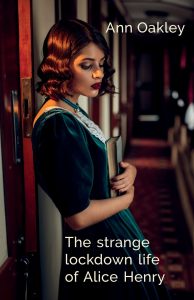 Published by Linen Press 25 January 2022
Published by Linen Press 25 January 2022
266pp, paperback, £10.99
Reviewed by Zoë Fairbairns
Alice is 74 years old, and in good health. She’s hoping to keep it that way, in spite of the pandemic raging around her. She spends long hours of lockdown thinking about death, not just her own (whenever and however it may occur), but also that of an early twentieth-century women’s rights campaigner called Maud Davies whose body was found in a railway tunnel in 1913, beheaded and stabbed, in a crime for which no one was ever convicted.
Shielding at home, Alice searches for the truth about Maud’s grisly end by Googling her way, on her laptop, through ancient railway timetables, census returns, feminist campaigning materials and crime reports. Other tasks include correcting the grammar of present-day academics for whom she works as a freelance copy-editor. It’s a service of which they stand in sore need, if the examples Alice wrings her hands over are anything to go by. (If one of her professors were to write that, she would probably correct it to ‘anything by which to go’. Come to that, she would probably also prefer ‘over which she wrings her hands’.) You see? It’s catching, just like Covid, or the BV, Bloody Virus, as she calls it.
Alice is aware of the social-distancing rules she is expected to follow, and the possible risks of not doing so, but she has friends to see, a far-flung family to keep tabs on, a part-time job in a bookshop, and a male customer with whom she is hoping to go to bed. And then there is what she refers to as ‘body housework’ – the non-virus-related medical encounters with dentists, opticians, physiotherapists, all masked, gloved, sanitized, asking questions about foreign travel, waving thermometers and taking away her handbag to lock it in a box. Isolation is hard work.
As is historical research about people who lived and died long ago and in relative obscurity. Apparently quite a lot of women were murdered on trains in the early twentieth century, sometimes by complete strangers who saw a perfect opportunity in the confined carriages and the easy escape routes from stations. Maud might have been one such victim. Or her feminist activism might have caught the hostile attention of sex traffickers who wanted to shut her up.
Alice’s suspicions, obsessions, fears, amusement and neediness interweave on the pages of Ann Oakley’s account of what all of us have in our different ways been going through, are still going through. One of the strangest things about Ann Oakley’s book is that use of the word ‘strange’ in the title – as if everyone else’s lockdown life is normal. But nothing’s normal any more. Perhaps the day will come when Alice and her factual equivalents will be historic figures for future historians and fiction writers to track down and speculate about. In the meantime, The Strange Lockdown Life of Alice Henry is oddly comforting, with lots to smile and nod at, alongside the stuff that makes you cringe and rage and shudder.
